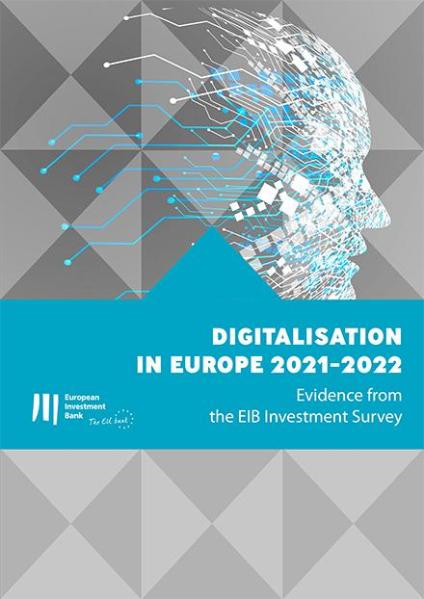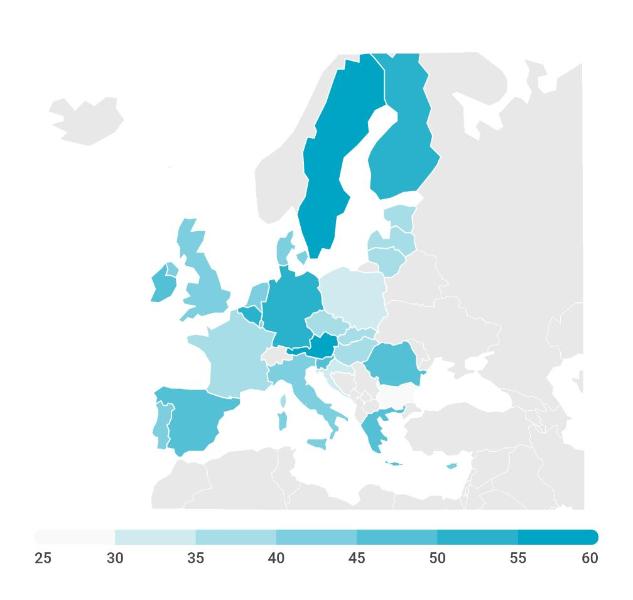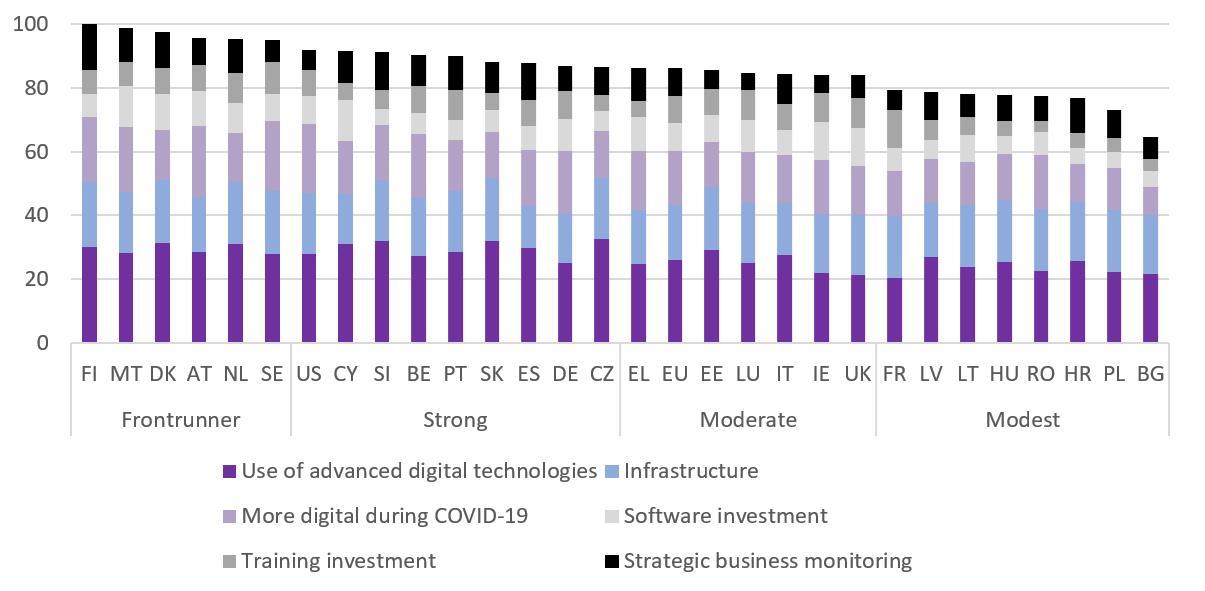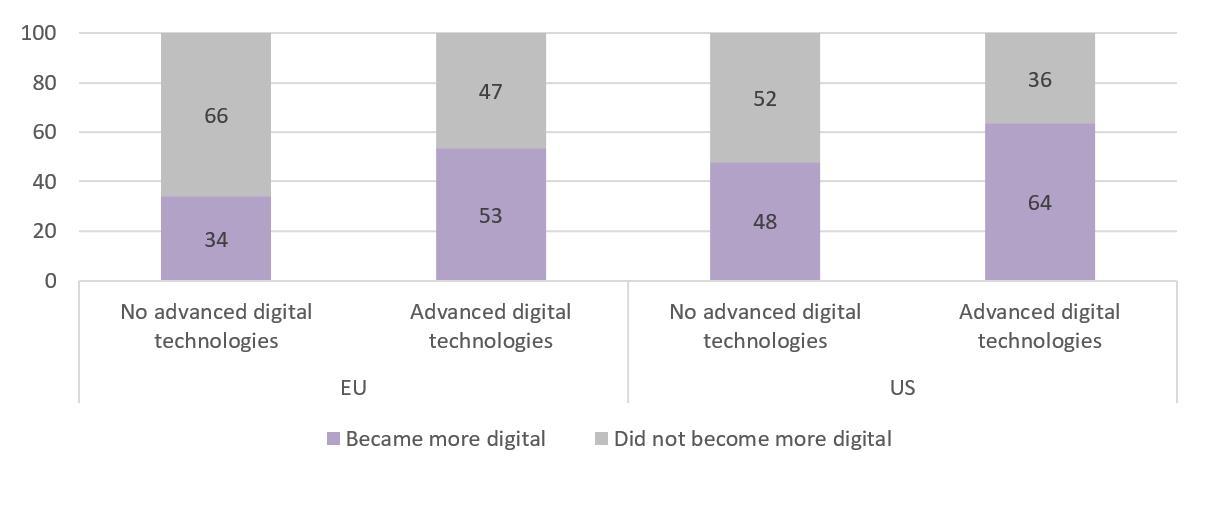
- The COVID-19 crisis accelerated the digital transformation of Europe’s economy.
- But firms put more complex digitalisation processes on hold.
- Digital firms were better able to cope with the disruption unleashed by the pandemic.
Close to half of the firms in the European Union report that they invested in digitalisation as a response to COVID-19. Digital firms fared better than non-digital firms through the pandemic. They were less likely to experience a strong decrease in sales from the beginning of 2020, and used the crisis more often as an opportunity to accelerate digitalisation. On average they were more productive, innovative, grew faster and paid higher wages.
Yet with digitalisation advancing, the digital divide in Europe is also increasing. Smaller firms and firms located in regions where digital infrastructure is lacking are at risk of being left behind. Europe needs to focus on three areas above all: an enabling ecosystem, a European vision to counter the imbalances in the European Union, and sufficient policy support to address finance and skills gaps.
These are some of the main findings of the new edition of the European Investment Bank’s Digitalisation In Europe 2021-2022: Evidence from the EIB Investment Survey that was published today. The new report includes the EIB Corporate Digitalisation Index, a cross-country ranking of digital adoption efforts in EU countries and the United States.
Read the summary of the report.
“During the pandemic, digital transformation often became essential for firms’ survival and sped up the transformation of European economy,” said EIB Vice-President Ricardo Mourinho Félix. “Yet we are also observing that the crisis forced many firms to put more complex digitalisation processes on hold. As we are entering a “new normal,” it will be crucial to restart these processes and accelerate the pace of advanced digital transformation in the European Union. The EIB Group stands ready to provide the necessary support.”
“Most EU companies tell us they used the pandemic as an opportunity to transform and start their digitalisation process. But over the period, the divide among firms increased, with less responsive ones facing the risk of falling behind. A lack of skills remains the main barrier to firms’ investment. In response, we need multifaceted policies to support digitalisation: technical assistance, skills and access to finance all play a role,” said EIB Chief Economist Debora Revoltella.
Digitalisation in the European Union during COVID-19 crisis
The pandemic sped up the pace of digital transformation. Many of the changes associated with digitalisation — services provided remotely, teleworking and online meetings — are likely to stay. In the European Union, 46% of firms report that they took action to become more digital — for example, by providing services online — according to the results of the EIB Investment Survey (EIBIS) conducted from April to July 2021.
Firms that invested to become more digital as a response to COVID-19 (in %), by country

Source: EIB Investment Survey 2021
Yet in contrast to the more general digital transformation, the adoption of new advanced digital technologies is stalling as firms put more complex digitalisation processes on hold during the crisis. The share of EU firms implementing these technologies, such as 3-D printing, advanced robotics or the internet of things, in their business stayed more or less constant from 2020 to 2021, reaching 61% in 2021, compared to significant increases in the previous years, with 63% notched up in 2020 and 58% in 2019.
Top performing countries in the EU
In 2021, Finland and Malta were the top two digital countries, followed by Denmark, Austria, the Netherlands and Sweden. The EIBIS Corporate Digitalisation Index explored the degree of digital adoption in the European Union and the United States from six different composite angles. The top performing EU countries, in individual areas of digitalisation, were as follows: the Czech Republic for the use of advanced digital technologies, Finland for digital infrastructure and the use of formal strategic business monitoring, which is an indicator of management practices, Austria for the uptake of digitalisation during the coronavirus pandemic, Cyprus for investment in software and data, and Sweden for investment in employee training.
EIBIS Corporate Digitalisation Index, by country

Source: EIB Investment Survey 2021
The European Union lags behind the United States in digitalisation
46% of EU firms report having taken action to become more digital during the COVID-19 crisis, compared with 58% of US firms. Furthermore, the share of firms using advanced digital technologies is higher in the United States (66%) than in the European Union (61%).
In the European Union, 53% of firms that had already adopted advanced digital technologies invested further in digitalisation during the pandemic. This compares to 34% of EU firms that were non-digital and used the crisis as an opportunity to begin investing in their digital transformation. A widening digital divide also exists in the United States, but non-digital firms were more dynamic. 64% of US firms that had already adopted advanced digital technologies invested further in digitalisation, while 48% of US firms that were non-digital started investing in digital technologies during the crisis.
Firms that use advanced digital technologies and invested to become more digital as a response to COVID-19 (in %)

Source: EIB Investment Survey 2021
Widening gap between digital and non-digital firms
The coronavirus pandemic, while stimulating digitalisation across the board, has also widened the digital divide among firms to some extent. 26% of EU firms have not invested in the digital transformation. These firms may need stronger or specific policy support to maintain their competitiveness and avoid falling behind during the economic recovery. At the other end of the spectrum, 61% of EU firms have already adopted advanced digital technologies.
Firm size plays a key role in the corporate digital divide. Larger firms are much more likely to be on the right (or digital) side of the corporate digital divide. If policymakers want to close the gap in adoption rates between EU and US firms, they need to help European firms grow to a sufficient size.
Main recommendations
Among its top policy recommendations, the report highlights that
- targeted financial support for smaller and medium-sized companies has proved effective in increasing their readiness to undertake transformative investment during the pandemic;
- for non-digital firms, advice on funding and consistent regulation would the best way to support their digital investments;
- improving skills and retraining need to be key policy targets to tackle the looming problem of reallocation in the labour market, avoiding a scenario where workers become trapped, on a large scale, in firms failing to adapt.
Background information
About the EIB Investment Survey
The annual EIB Group Survey on Investment and Investment Finance (EIBIS) is an EU-wide survey that gathers qualitative and quantitative information on investment activities by small businesses (with between five and 250 employees) and larger corporates (with more than 250 employees), their financing requirements and the difficulties they face.
The current edition collected data from approximately 13 500 businesses in total across the European Union the United Kingdom and the United States between April to July 2021. Using a stratified sampling methodology, EIBIS is representative across
- all Member States of the European Union and the US;
- firm size classes (micro to large);
- four main sectors (manufacturing, services, construction and infrastructure).
The survey is designed to build a panel of observations to support time series analysis, and these observations can also be linked to firm balance sheet and profit and loss data. EIBIS has been developed and is managed by the Economics Department of the EIB, with support for development and implementation by Ipsos MORI.
Find out more: EIB Investment Survey (EIBIS) — Details
About the European Investment Bank
The European Investment Bank (EIB) is one of the largest multilateral providers of climate finance worldwide and recently announced that it will unlock and support €1 trillion of investment in climate action and environmental sustainability in the decade to 2030. At least 50% of EIB finance will go towards climate action and environmental sustainability by 2025. By the end of 2020, all EIB Group financing activities will be aligned with the goals of the Paris Agreement.
Find out more about EIB research: Our research (eib.org)